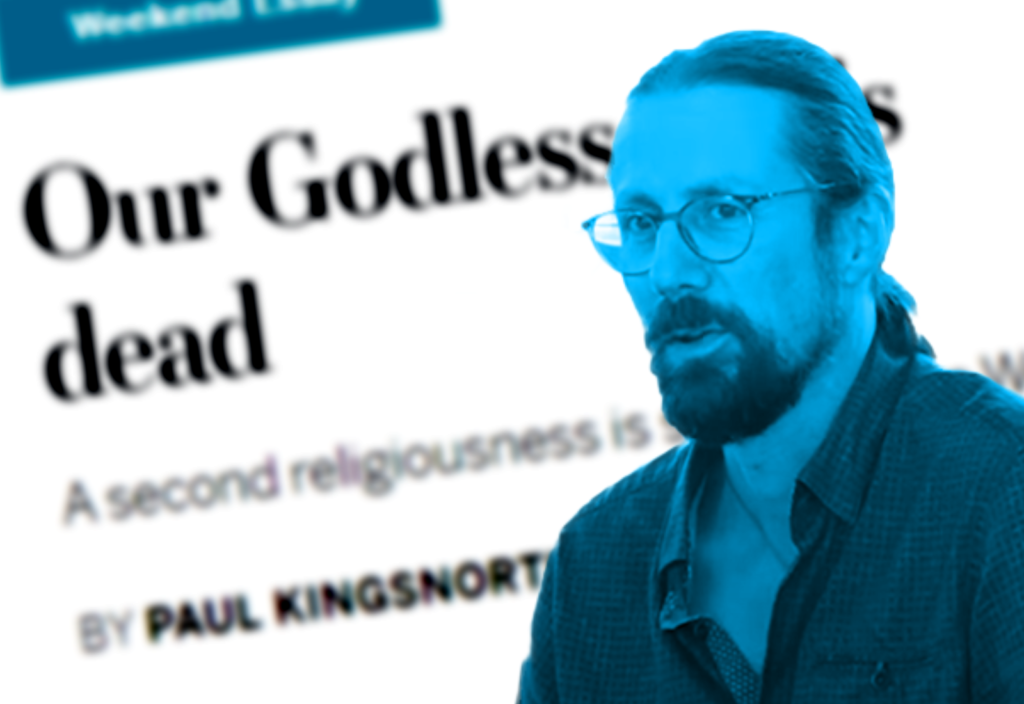Bari Weiss’s highly successful Substack site, The Free Press, hosted a debate in March. All good rationalists would do well to watch it (see here on YouTube). The debate was between Ross Douthat and Ayaan Hirsi Ali on one side, and Michael Shermer and Adam Carolla on the other, on the topic: ‘Does the West need a religious revival?’
What’s your prior, or your instinctive, reaction? Note it and proceed.
The debate was held in the Paramount Theatre, in Austin, Texas, and was attended by 1,300 people. Those people were asked, before the debate began, whether they believed the West needed a religious revival. A striking 73 per cent said they did. That number fell to 61 per cent by the end of the debate, but that still left a clear majority on the ‘yes’ side.
What were the arguments? Ross Douthat, 45 years of age and a former senior editor at The Atlantic, is a weekly columnist at The New York Times. In his opening statement for the affirmative side, he stated: “The convergence of secularization with political derangement and cultural despair is not a coincidence.”
Carolla, 60 years of age, is an American radio personality, comedian, actor and podcaster. His podcast, The Adam Carolla Show, set the record as the most downloaded podcast of 2011, according to Guinness World Records.
The names Ayaan Hirsi Ali and Michael Shermer are likely to be well known to all rationalists. What’s striking is that they took opposite sides in this debate in Austin. That’s because Ayaan Hirsi Ali, who declared herself an atheist after fleeing and denouncing Islam, now says she is a Christian, because the West is under threat in a ‘civilisational war’.
That seems to me an odd reason to decide one is a Christian rather than an atheist. But it does sit well with the old claim by Christian apologists that “there are no atheists in foxholes”. The most appropriate retort to that assertion might be: “Perhaps because soldiers in foxholes are generally uneducated youths who regress to childhood when terrified.”
But what were the competing claims in this well-attended debate? Absurdly, the lead-in features Donald Trump saying: “I think this is a country that needs religion. It’s like the glue that holds it together.” From a man of that moral character?
Yet, that is, basically, the argument advanced by Douthat and Hirsi Ali – that Western society is dying because of the “death of God”.
Shermer and Carolla, in response, argue that certainly there are social pathologies in our time, but that they are grounded not in the evaporation of “good old-time religion” as much as in the intense strains of living in mass society at a time of relentless technological and economic change and sharply increased social inequality.
One suspects that those who shifted from the disagree to agree side of the proposition, after listening to the debate, were swayed by two conjoined propositions: 1) loss of religious faith has accelerated in the 21st century; and 2) epidemics of depression, despair, drug addiction and secular fanaticism have followed.
The data are clear enough. What’s unclear is the causal link. But what the ‘yes’ camp appears to overlook, or brush aside, is that there are very good reasons why religious belief has been in retreat and, even if it can be proved that this has caused the social pathologies in question, one cannot, for that reason, simply bring traditional belief back to life. It wasn’t abandoned absent-mindedly, but rejected.
What Friedrich Nietzsche famously called “the death of God” came about because the narrative imparted by religious doctrine for millennia lost its credibility. Crucially, Nietzsche declared that this would prove to be the cause of nihilism and social upheavals, but that there was no way back, given what the cosmological and earth sciences had shown – even by 1885. “Who gave us the sponge”, cries his madman in the marketplace, “with which to wipe away the entire horizon?”
As for the idea that we ought collectively to embrace Christian belief (of some kind) and rally around the cross to defend the West against Islam and China, one wonders what the proponents of such a crusade have been smoking. To begin with, it was Europeans, inspired by a witch’s brew of Christian fervour and desire for exotic treasures, who conquered the globe between 1492 and 1945. Do they imagine something similar occurring if they could fill the pews of churches again?
It was the great sociologist Max Weber (1864-1920) who wrote, a hundred years ago, of the disenchantment of the world and wondered what would fill the spiritual void in a society without inspired belief or sources of redemptive grace. Our answer cannot be “turn back, O man” to the Bible. We must find inspiring and tenable meaning in the immense richness of the cosmos and deep time that our sciences have opened before our eyes.
This was my point of departure, a decade ago in Credo and Twelve Poems, in setting out my understanding of the realities we must own and embrace. I do not see anything redemptive in attempts to re-impose Islam on the Arab world, or in Africa. I do not see anything redemptive in the Chinese Communist Party’s authoritarian pseudo-Confucianism. Nor would I see anything redemptive in either Catholic or Pentecostalist revival in the West.
What is sorely needed is a sweeping movement calling upon us all to grasp the realities of our situation: a risen ape, not a fallen being; a species which has sprung out of the last Ice Age as a master of invention and social organisation, and which has made itself the global apex predator and thrown open both the depths of space and the depths of time to its understanding.
Those things transcend any religion. But they require us to mature and so conduct ourselves that we do not, at this juncture, lay the Earth waste and ruin the possibilities we have created for ourselves. Do we have the energy and creativity for that?
Published 18 April 2025.
If you wish to republish this original article, please attribute to Rationale. Click here to find out more about republishing under Creative Commons.
Photo by Jametlene Reskp on Unsplash.














